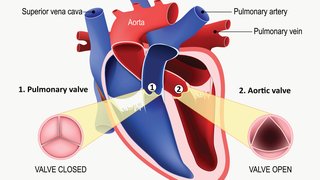
There are multiple tests and screenings that can help determine a person’s risk for heart disease, but one in particular stands out because it’s highly effective and totally free.
Knowing your family health history provides crucial information that can help reduce your risk of having a heart attack or stroke and improve the cardiovascular health of your children and grandchildren.
For example, if a parent or sibling had premature coronary artery disease or a heart attack – for men, younger than 55 and women younger than 65 – your risk of having one doubles. If you have multiple family members who had heart disease, or if they were even younger when it developed, your risk could be increased up to 12-fold.
Now, just because a family member had a heart problem doesn’t mean you will, too. But if heart disease appears in your family tree, you should consider talking with a preventive cardiologist to determine whether the condition is inherited, which tests and screenings make sense for your family, and what adjustments will improve your heart health.
While you can’t change the genetic hand you’ve been dealt, understanding your family health history will put you – and the next generation of your family – in a better position to have a heart healthier future.
The first step is to do a little homework.
How to collect your family heart health history
The general rule for compiling your family health history is “the more the better.” Start by talking to as many relatives as you can on your mother and father’s sides, making sure to ask for specifics.
It’s not uncommon to get conflicting accounts from relatives, so you may need to dig a little deeper. I’ve been known to request and review autopsy reports of family members for my patients, or we’ll call their family members together to ask specific questions.
If you are adopted, check with the adoption or social service agency for any relevant information. You can gain insights through genetic testing or potentially learn about heritable risk factors through commercial DNA databases.
The U.S. Surgeon General offers a helpful online tool, My Family Health Portrait, that can help you gather and record your family health history. As you compile your file, include details such as:
- Relatives who had chronic diseases, such as:
- Maternal grandfather had high blood pressure
- Paternal aunt had Type 2 diabetes
- Sister had a heart attack
- Uncle had bypass surgery
- Behaviors such as drug, alcohol, or tobacco use
- Age when condition was diagnosed or event occurred
- Where they were born and lived
- Profession or industry of work
- Level of stress
- Cause of death
- Age at death
Once you’ve filled out as much of your family health history as possible, share it with your doctor and family members. Bring it to your regular checkups. Add new information as you learn about it and alert your doctor to any new diagnoses or deaths in the family.
Your next steps will be to talk with your primary care doctor about which tests you and your family might need. If you have a family history of heart attacks, you may want to see a cardiologist to get cardiac screenings such as a cardiac CT scan for calcium scoring to detect problems early.
Related reading: Four people who should see a preventive cardiologist
Get the right tests – and don’t ignore history
It’s alarming how many people don’t heed the warning signs in their family history or don’t get the simple tests and screenings that could help add many healthy years to their lives. Following are some common assessments we recommend for some patients that take very little of a patient’s time while giving them a lot of actionable insights:

- Blood pressure and cholesterol screening
- Diabetes screening
- Electrocardiogram
- Echocardiogram
- Coronary artery calcium scan
- Genetic testing
Based on the results of these simple assessments, we can set up a strategy to reduce your risk of heart attack, stroke, and other cardiovascular conditions.
Young people who are generally healthy can often start with lifestyle changes, such as eating a healthier diet, exercising more, limiting alcohol and tobacco use. But don’t accept too much tolerance for borderline high numbers in your cholesterol, blood glucose, or blood pressure screenings. While you or your provider might think there is “plenty of time” to lower your levels, that time flies. Putting the horse back in the barn now is much easier than trying to corral it after it starts running wild.
Some families pass down genetic mutations that can significantly increase the risk of developing heart disease, despite a patient’s best efforts toward heart health. A good example of this is familial hypercholesterolemia (FH), which causes high levels of low-density lipoprotein (LDL) cholesterol (“bad cholesterol”) and a higher risk of heart disease and heart attacks.
While FH affects about one in every 250 people, many people don’t know they have it. They may feel fine today, but high levels of cholesterol are building to a breaking point in their blood vessels. If a family health history shows multiple family members have abnormally high cholesterol levels, we can do genetic testing to check for the genetic defect associated with FH.
When I diagnose a patient with FH, I immediately recommend that their first-degree relatives get tested as well, especially children. That’s because if you have FH, the clock for heart disease starts ticking at birth. The earlier we can start treatment, the healthier you and future generations of your family can remain.
All in the family: A genetic link for critically high cholesterol
Genetic testing confirmed that Zoe Allen has familial hypercholesterolemia – a condition that causes extremely high cholesterol and stretches at least three generations back in her family. Over the years, UT Southwestern has helped great-grandmother, grandmother, mother, and daughter all cut their cholesterol in half.
Give your children a heart-healthy start, sooner
While we work aggressively to improve your heart health, we’ll keep in mind that we have another big opportunity to help someone who’s not even in the room – your children. Most people start thinking about their heart health in their 40s and 50s, but the earlier in life we start taking action to prevent heart disease, particularly for those with a family history of cardiovascular disease, the better.
We know that if a middle-aged patient with high cholesterol takes a statin medication, they lower their risk of heart attack or stroke by about 20-30%. But a study by Helen Hobbs, M.D., award-winning researcher and investigator at UT Southwestern, showed that if you lower your cholesterol earlier in life by 15% or 20%, which you can accomplish with a good diet, you can reduce your risk of heart attack later in life by 85%.
It's like compounding interest for your heart. Doing even a little bit now to help your kids eat better, exercise more, or take medication if needed, can potentially help them break the cycle of heart disease in your family. This is true for young children, teens, and even adult children in their 20s or 30s – the sooner healthy habits are formed, the better.
Make sure your child’s pediatrician knows about your family health history. For example, children with a family history of high cholesterol, whose parents or grandparents had early heart attacks, or whose health background is unknown, should get their cholesterol checked starting at age 2 per the American Academy of Pediatrics and the National Institutes of Health National Heart, Lung, and Blood Institute.
The U.S. Food and Drug Administration (FDA) has approved statins starting at age 8 for children with FH.
Research published in the New England Journal of Medicine showed that starting a statin for FH in childhood reduced patients’ risk of heart disease 20 years later. The treatment lowered their cholesterol levels by nearly a third and slowed the accumulation of plaque in their blood vessels on par with the patients’ non-FH affected siblings.
Similar results are possible in managing other conditions that affect heart health in childhood, such as type 2 diabetes, obesity, and high blood pressure.
UT Southwestern partners with the pediatric cardiologists at Children’s Health to make sure kids who carry heart-related genetic mutations get the assessments and tools they need to lead heart-healthy lives. If something in your child’s family health history catches your attention, don’t hesitate to ask the pediatrician.
Uncovering family health history empowers you – and other family members – to be proactive when it comes to caring for your heart health. Your future generations will reap the rewards of the detective work you put in now.
If you are concerned about your personal or family health history of heart disease, call 214-645-8300 or request an appointment online.
Meet Dr. Amit Khera
As Director of the Preventive Cardiology Program at UT Southwestern, Amit Khera, M.D., specializes in helping patients assess their cardiac risk factors to head off heart disease whenever possible. He also has a passion for conducting research on the subject of preventing cardiac disease and training the next generation of preventive cardiologists.











